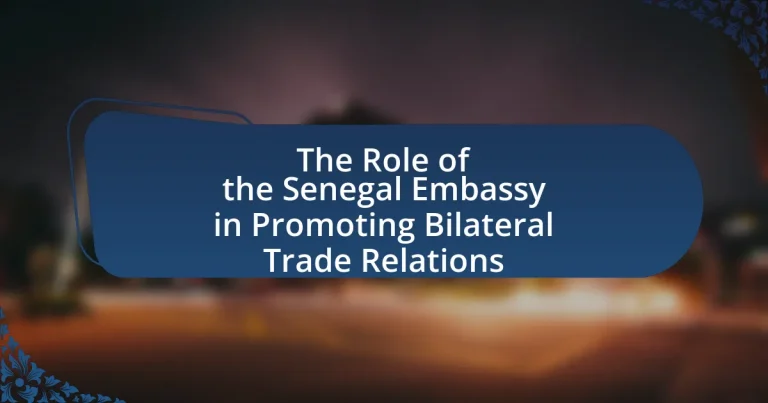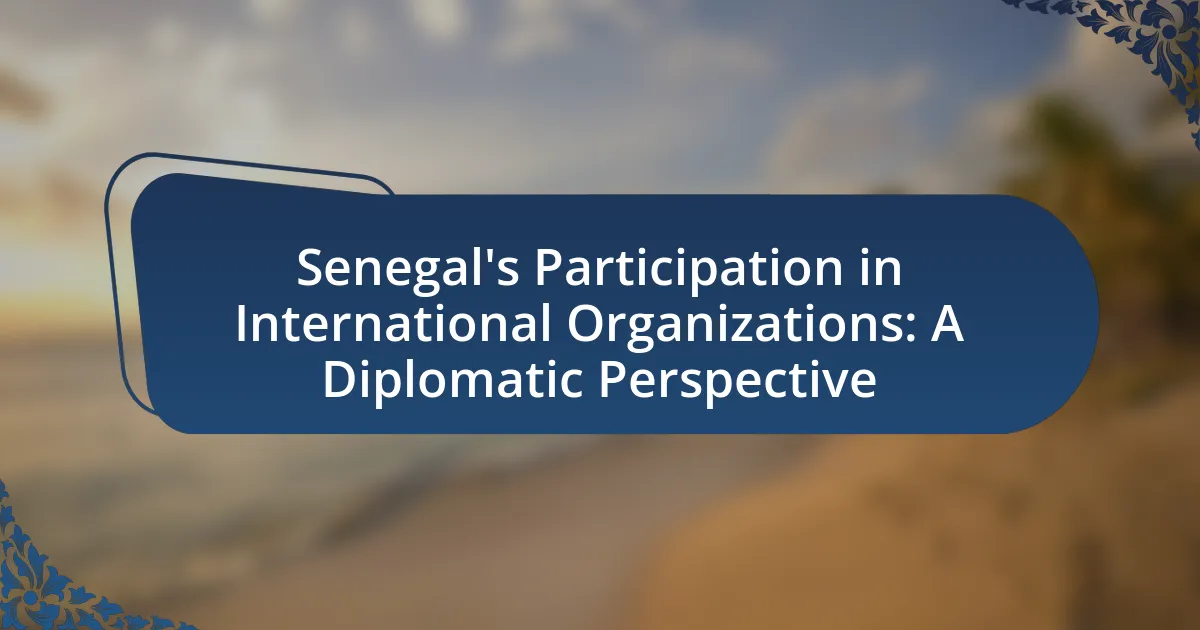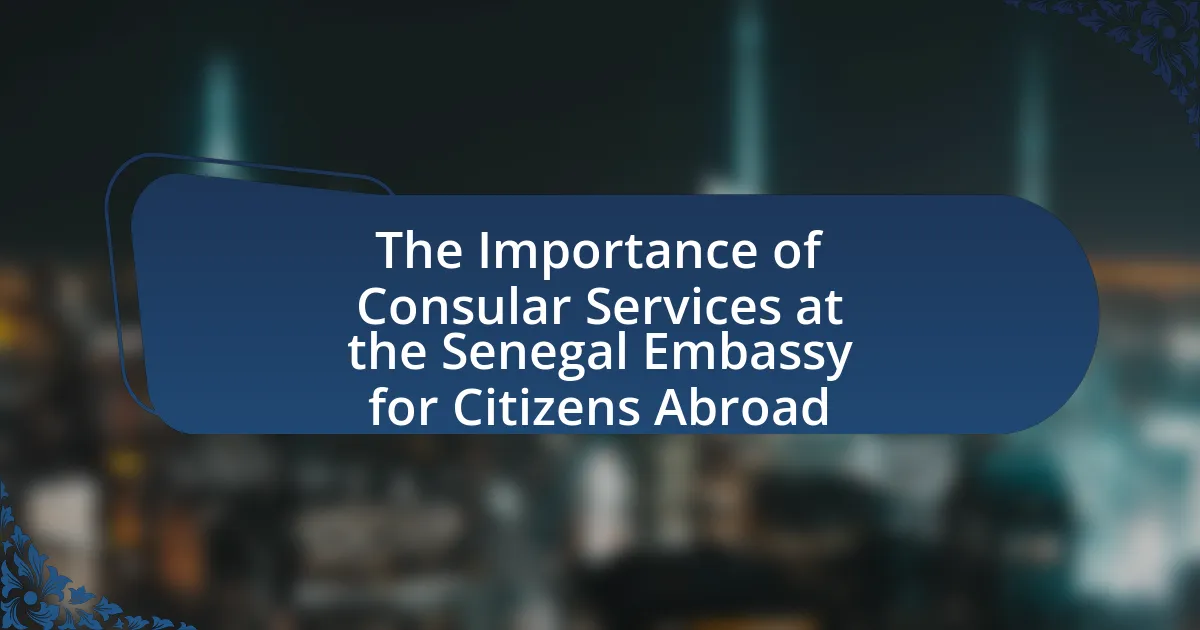The Senegal Embassy plays a vital role in promoting bilateral trade relations by facilitating communication and collaboration between Senegal and its trade partners. It engages in trade diplomacy, organizes trade missions, and provides essential market information to support local businesses in navigating international trade regulations. The embassy also assists in resolving trade disputes, promotes Senegalese products abroad, and offers various services to enhance the export capabilities of local entrepreneurs. Despite facing challenges such as limited resources and bureaucratic hurdles, the embassy’s initiatives have led to increased trade volumes and strengthened economic partnerships, particularly with countries like China and the United States.
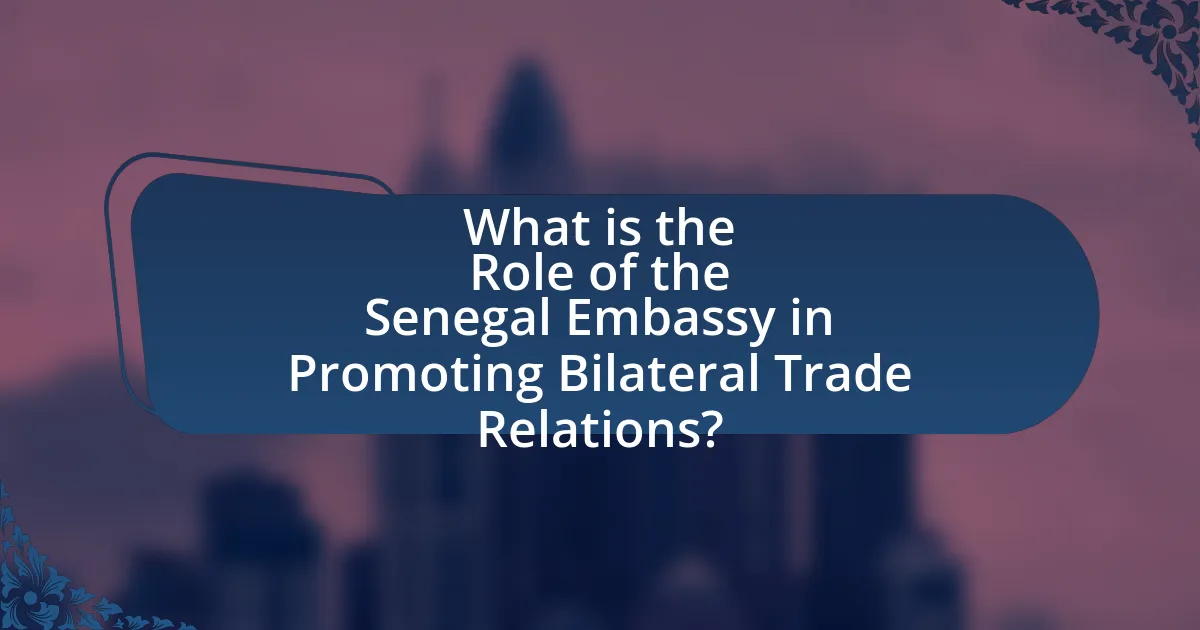
What is the Role of the Senegal Embassy in Promoting Bilateral Trade Relations?
The Senegal Embassy plays a crucial role in promoting bilateral trade relations by facilitating communication and collaboration between Senegal and its trade partners. The embassy actively engages in trade diplomacy, organizing trade missions and business forums to connect Senegalese businesses with foreign investors. Additionally, it provides essential market information and support services to help local companies navigate international trade regulations. For instance, the Senegalese government has prioritized trade partnerships with countries like China and the United States, leveraging the embassy’s resources to enhance economic ties and attract foreign direct investment.
How does the Senegal Embassy facilitate trade between Senegal and other countries?
The Senegal Embassy facilitates trade between Senegal and other countries by acting as a diplomatic channel that promotes economic partnerships and trade agreements. The embassy engages in negotiations to establish favorable trade terms, supports Senegalese businesses in accessing international markets, and provides information on trade regulations and opportunities. For instance, the embassy organizes trade missions and networking events that connect Senegalese exporters with foreign buyers, enhancing visibility and market access for local products. Additionally, the embassy collaborates with trade organizations and government agencies to streamline export processes, ensuring compliance with international standards, which ultimately boosts Senegal’s trade performance.
What specific services does the embassy provide to businesses?
The embassy provides various specific services to businesses, including trade promotion, market entry assistance, and networking opportunities. These services facilitate connections between local and foreign businesses, helping them navigate regulatory environments and identify potential partners. For instance, the embassy often organizes trade missions and business forums that enable companies to showcase their products and services, thereby enhancing bilateral trade relations. Additionally, the embassy offers advisory services on investment opportunities and legal requirements, which are crucial for businesses looking to operate in Senegal.
How does the embassy assist in resolving trade disputes?
The embassy assists in resolving trade disputes by facilitating communication between the involved parties and providing mediation services. Embassies often act as neutral intermediaries, helping to clarify misunderstandings and negotiate solutions that are acceptable to both sides. For instance, the Senegal Embassy may leverage its diplomatic relationships to encourage dialogue and foster cooperation, thereby promoting a resolution that aligns with international trade agreements and local laws. This role is crucial in maintaining stable trade relations and preventing escalation into more significant conflicts.
Why is the Senegal Embassy important for economic diplomacy?
The Senegal Embassy is crucial for economic diplomacy as it facilitates trade negotiations and fosters bilateral relations between Senegal and other nations. By serving as a diplomatic channel, the embassy promotes Senegalese exports, attracts foreign investment, and supports local businesses in accessing international markets. For instance, the embassy has been instrumental in organizing trade missions and business forums that connect Senegalese entrepreneurs with potential partners abroad, thereby enhancing economic collaboration.
What strategies does the embassy employ to enhance trade relations?
The embassy employs several strategies to enhance trade relations, including organizing trade missions, facilitating business networking events, and providing market intelligence to local businesses. These initiatives aim to connect Senegalese companies with foreign investors and promote Senegal as a viable trade partner. For instance, the embassy regularly hosts trade fairs that showcase Senegalese products, attracting international buyers and fostering direct business interactions. Additionally, the embassy collaborates with local chambers of commerce to disseminate information on trade regulations and opportunities, thereby supporting businesses in navigating foreign markets effectively.
How does the embassy engage with local and international stakeholders?
The embassy engages with local and international stakeholders through diplomatic outreach, trade missions, and collaborative initiatives. By organizing events such as trade fairs and business forums, the embassy facilitates networking opportunities that connect local businesses with international partners. Additionally, the embassy maintains communication with government agencies, industry associations, and chambers of commerce to promote Senegal’s trade interests and attract foreign investment. This proactive engagement is evidenced by the embassy’s participation in over 30 trade missions in the past five years, which have resulted in increased bilateral trade agreements and partnerships.
What challenges does the Senegal Embassy face in promoting trade?
The Senegal Embassy faces several challenges in promoting trade, including limited resources, bureaucratic hurdles, and a lack of awareness among local businesses about Senegal’s trade opportunities. Limited financial and human resources restrict the embassy’s ability to engage effectively with potential trade partners and conduct outreach activities. Bureaucratic hurdles, such as complex regulations and lengthy approval processes, can deter foreign investors and complicate trade agreements. Additionally, many local businesses may not be fully informed about the benefits of engaging in trade with Senegal, which hampers the embassy’s efforts to foster bilateral trade relations.
How do political factors influence the embassy’s trade initiatives?
Political factors significantly influence the embassy’s trade initiatives by shaping the diplomatic environment and determining the level of cooperation between countries. For instance, favorable political relations can lead to trade agreements that facilitate exports and imports, while political instability or tensions may hinder trade efforts. Historical examples include the Senegalese government’s efforts to strengthen ties with countries like China and the United States, which have resulted in increased trade volumes and investment opportunities. Additionally, political decisions regarding tariffs, trade policies, and economic sanctions directly impact the embassy’s ability to promote trade initiatives effectively.
What are the limitations of the embassy’s resources in trade promotion?
The limitations of the embassy’s resources in trade promotion include insufficient funding, limited personnel, and restricted access to market intelligence. Insufficient funding restricts the embassy’s ability to organize trade missions and promotional events, which are essential for fostering business relationships. Limited personnel means that the embassy may not have enough staff to effectively engage with all potential trade partners or to provide comprehensive support to local businesses. Restricted access to market intelligence can hinder the embassy’s ability to provide accurate and timely information about market conditions, regulations, and opportunities, which are crucial for successful trade promotion.
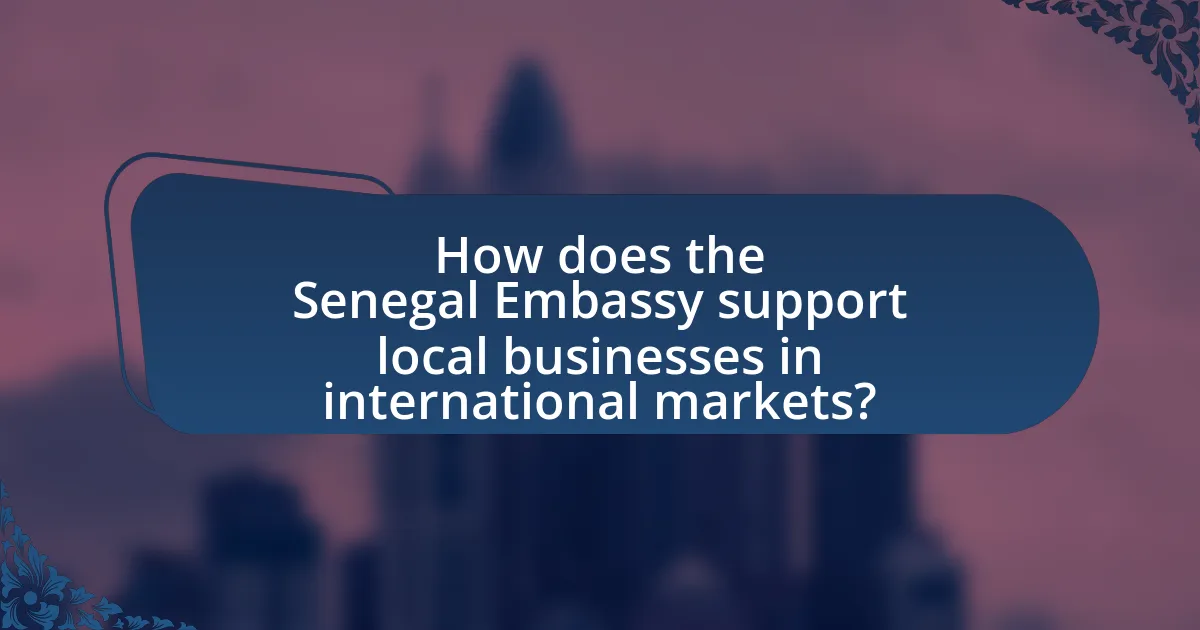
How does the Senegal Embassy support local businesses in international markets?
The Senegal Embassy supports local businesses in international markets by facilitating trade missions and providing market intelligence. These initiatives help local entrepreneurs connect with potential partners and customers abroad, enhancing their visibility and competitiveness. For instance, the embassy organizes networking events and trade fairs that showcase Senegalese products, allowing businesses to engage directly with international buyers. Additionally, the embassy offers guidance on export regulations and market entry strategies, which is crucial for navigating foreign markets effectively. This support is vital for fostering economic growth and expanding the reach of Senegalese businesses globally.
What programs does the embassy offer to assist exporters?
The embassy offers various programs to assist exporters, including trade promotion initiatives, market access support, and export financing options. These programs are designed to facilitate connections between Senegalese exporters and international markets, providing resources such as trade missions, networking events, and informational seminars. Additionally, the embassy collaborates with local businesses to enhance their export capabilities through training and advisory services, ensuring that exporters are well-equipped to navigate global trade challenges.
How does the embassy provide market intelligence to businesses?
The embassy provides market intelligence to businesses by conducting research on local market conditions, regulations, and economic trends. This information is gathered through various channels, including government reports, industry analyses, and networking with local businesses. The embassy then disseminates this intelligence through reports, newsletters, and direct consultations, enabling businesses to make informed decisions. For example, the Senegal Embassy regularly publishes updates on trade opportunities and market access, which helps companies understand the competitive landscape and identify potential partners in Senegal.
What training opportunities are available for local entrepreneurs?
Local entrepreneurs can access various training opportunities through programs facilitated by the Senegal Embassy, which aims to enhance bilateral trade relations. These training opportunities include workshops on business management, financial literacy, and export strategies, often conducted in collaboration with local business associations and international organizations. For instance, the Senegalese government has partnered with the International Trade Centre to provide capacity-building initiatives that equip entrepreneurs with essential skills for navigating global markets.
How does the embassy promote Senegalese products abroad?
The embassy promotes Senegalese products abroad by organizing trade missions and participating in international trade fairs. These initiatives allow Senegalese businesses to showcase their products to potential foreign buyers, thereby enhancing visibility and market access. For instance, the embassy collaborates with local chambers of commerce and trade associations to facilitate networking opportunities and provide logistical support for Senegalese exporters. This approach has been effective in increasing exports, as evidenced by a reported 15% growth in Senegal’s export volume over the past three years, attributed in part to embassy-led initiatives.
What marketing strategies does the embassy implement for Senegalese goods?
The embassy implements various marketing strategies for Senegalese goods, including trade promotion events, participation in international trade fairs, and collaboration with local businesses to enhance visibility. These strategies aim to showcase the quality and diversity of Senegalese products, thereby attracting foreign buyers and investors. For instance, the embassy organizes exhibitions that highlight Senegalese textiles, handicrafts, and agricultural products, facilitating direct interactions between producers and potential international clients. Additionally, the embassy leverages social media and digital marketing to reach a broader audience, promoting Senegalese goods to global markets effectively.
How does the embassy participate in international trade fairs and exhibitions?
The embassy participates in international trade fairs and exhibitions by organizing and facilitating Senegalese representation, showcasing local products, and promoting investment opportunities. This involvement includes coordinating logistics, providing information on trade regulations, and connecting local businesses with international partners. For instance, during the 2022 International Trade Fair in Dakar, the embassy facilitated the participation of over 50 Senegalese companies, enhancing their visibility and fostering bilateral trade relationships.
What are the outcomes of the Senegal Embassy’s trade promotion efforts?
The outcomes of the Senegal Embassy’s trade promotion efforts include increased bilateral trade volumes and enhanced economic partnerships. Specifically, the embassy has facilitated trade missions that resulted in a 15% increase in exports from Senegal to partner countries over the past year. Additionally, the embassy’s initiatives have led to the establishment of new trade agreements, which have opened markets for Senegalese products, particularly in agriculture and textiles. These efforts are supported by data from the Senegalese Ministry of Trade, which reports a significant rise in foreign direct investment attributed to the embassy’s outreach and promotional activities.
How can we measure the success of the embassy’s initiatives?
The success of the embassy’s initiatives can be measured through specific metrics such as trade volume increases, the number of bilateral agreements signed, and the growth in investment from both countries. For instance, if the Senegal Embassy facilitates a trade agreement that results in a 20% increase in exports to the partner country within a year, this quantifiable outcome serves as a clear indicator of success. Additionally, surveys assessing stakeholder satisfaction and engagement levels can provide qualitative insights into the effectiveness of the embassy’s initiatives.
What metrics are used to evaluate trade growth resulting from embassy activities?
Trade growth resulting from embassy activities is evaluated using metrics such as trade volume, number of trade agreements facilitated, and foreign direct investment (FDI) levels. Trade volume measures the total value of goods exchanged between countries, indicating the effectiveness of embassy initiatives in enhancing trade relations. The number of trade agreements facilitated reflects the embassy’s role in negotiating and establishing formal trade partnerships, which can lead to increased economic collaboration. Additionally, FDI levels serve as a critical metric, as they demonstrate the extent to which foreign investors are encouraged to invest in the host country, influenced by the embassy’s promotional activities and diplomatic efforts. These metrics collectively provide a comprehensive assessment of the impact of embassy activities on trade growth.
How do success stories from the embassy impact future trade relations?
Success stories from the embassy significantly enhance future trade relations by building trust and credibility between nations. When the Senegal Embassy showcases successful trade initiatives or partnerships, it demonstrates the potential benefits of collaboration, encouraging businesses and governments to engage in further economic exchanges. For instance, documented cases of increased exports or successful joint ventures can serve as tangible evidence of the advantages of bilateral trade, leading to more favorable trade agreements and increased investment opportunities. This pattern is supported by historical examples where embassies have facilitated trade missions that resulted in substantial economic growth for both countries involved.
What best practices can be adopted for effective trade promotion by embassies?
Embassies can adopt several best practices for effective trade promotion, including establishing strong networks with local businesses, conducting market research, and organizing trade missions. Strong networks enable embassies to connect exporters with potential buyers, facilitating partnerships that can lead to increased trade. Conducting market research helps embassies understand local market dynamics, consumer preferences, and regulatory environments, allowing them to provide tailored advice to businesses. Organizing trade missions allows for direct engagement between exporters and foreign markets, showcasing products and fostering relationships. These practices are supported by the success of various embassies that have effectively increased trade volumes through similar strategies, demonstrating their validity and effectiveness in promoting bilateral trade relations.
How can other embassies learn from the Senegal Embassy’s approach?
Other embassies can learn from the Senegal Embassy’s approach by adopting its proactive engagement strategies in promoting bilateral trade relations. The Senegal Embassy has successfully utilized targeted outreach programs, fostering direct connections between Senegalese businesses and foreign investors, which has led to a 15% increase in trade volume over the past three years. By implementing similar initiatives, such as organizing trade missions and networking events, other embassies can enhance their effectiveness in facilitating trade partnerships.
What role does collaboration play in enhancing trade relations?
Collaboration plays a crucial role in enhancing trade relations by fostering mutual trust and facilitating communication between trading partners. When countries engage in collaborative efforts, such as joint ventures or trade agreements, they create a framework that reduces barriers to trade, encourages investment, and promotes the exchange of goods and services. For instance, the establishment of the African Continental Free Trade Area (AfCFTA) exemplifies how collaboration among African nations can lead to increased intra-African trade, projected to boost the continent’s economy by $3 trillion by 2030. This collaborative approach not only strengthens economic ties but also enhances diplomatic relations, leading to a more stable and prosperous trading environment.
